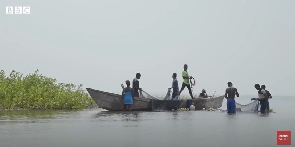A BBC Africa Eye investigation has uncovered how a US-based anti-human trafficking organisation International Justice Mission (IJM) may be falsely separating children from their families as part of their operations.
In a documentary titled “The Night They Came for Our Children” BBC uncovered two classical instances where the multimillion donor funded organisation instigated an anti-trafficking operation with the help the Ghana Police Service and social service department.
In both cases, the BBC said “there was scarce-to-no evidence of trafficking” however the children were removed from their homes while their relatives had to endure prosecution that landed some in jail.
In September 2022, IJM led a night operation in Northern Ghana, a community called Mogyigna where four children were pulled out of bed.
Two of the children’s uncles were also taking by gun touting police officers while the children’s grandmother was left with questions without answers.
Describing the aggressive operation in Mogyigna as fuelled by “target-driven culture inside IJM” BBC’s investigation found two documented cases of rescue operations in which children were forcibly, traumatically and unjustly removed and the children's relatives prosecuted as child traffickers including the case of 11-year-old Fatima .
Through their investigation into concerns about the modus of IJM in Ghana, a BBC undercover journalist was placed on the staff of the NGO.
With access to the organisations staff WhatsApp platform and social services documents, the investigation unearthed evidence that showed that while IJM informed the police and social services that the children from Mogyigna were victims of trafficking, a different conclusion had been drawn within the charity.
A legal officer with the organisation in an internal message noted that there were “no elements of trafficking” in the case of Fatima and two of the four children taken from Mogyigna.
The officer noted that only one of the four cases, Fatima's cousin Mohammed, included elements of trafficking. That however was also challenged by the family.
Despite the legal officer’s advice, the organisation concluded that all four children, aged between five and 11, were at risk of being used for child labour and thus proceeded.
For four months the children were separated from their family. An investigation by Ghanaian social services concluded the children had not been trafficked and eventually led to them being reunited with their families.
A similar case identified by the BBC investigation was in 2019 where an operation removed a boy and his sibling from their family and led to the children's mother, Mawusi Amlade, being sentenced to five years in prison for child trafficking.
Two years after her incarceration, Amlade's conviction was quashed after an intervention by another US NGO, the Sudreau Global Justice Institute - a partner of IJM.
Four years after her discharge however, the mother is yet to be reunited with her children.
In the case of the four Mogyigna children, Fatima's uncles, Nantogma Abukari and Sayibu Alhassan, who were arrested during the operation were prosecuted on charges of child trafficking and child labour and spent all their savings to attend court and bail hearings.
After spending more than 1,500 Ghana cedis ($132; £104) in travel in travel expenses for each hearing, their case was eventually dropped and their names cleared.
However the trauma of the entire experience continues to haunt the family and the community.
BBC’s undercover reporter, secretly filmed conversation with a senior IJM staff member, the reporter was told IJM staff needed to rescue a set number of victims and secure a set number of prosecutions every year.
Another staff member said that IJM staff were denied pay rises or were at risk of being sacked if they did not reach these targets.
We can't say we didn't get even one, we need to get some," the official told the reporter when asked what would happen if a staff on a mission was unable to take children away,
Meanwhile the BBC said IJM has denied the allegation of practicing a target-driven culture.
It said the charity's Ghana's team was "led and staffed by Ghanaian nationals who support the Ghanaian authorities to bring trafficked children to safety, help restore survivors' physical and mental wellbeing, and stop those responsible for illegally exploiting children".
It added: "Our approach always has the welfare of the child at its core. The 76 operations that IJM Ghana has supported have led to hundreds of children being brought to safety by the Ghanaian authorities."
Watch the BBC Africa Eye investigation below:
GA/SARA
You can also watch this episode of People & Places here:
Watch the latest episode of Everyday People on GhanaWeb TV below:
You can also watch this feature on climate change and its impact on fish and sea life:
Share your news stories and ideas with GhanaWeb

To advertise with GhanaWeb

General News of Monday, 10 July 2023
Source: www.ghanaweb.com













